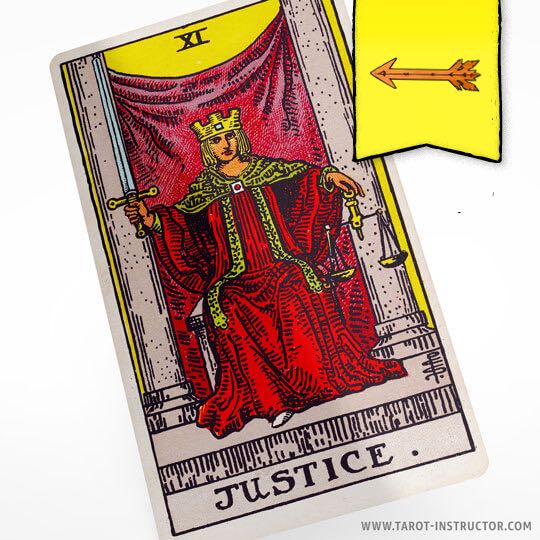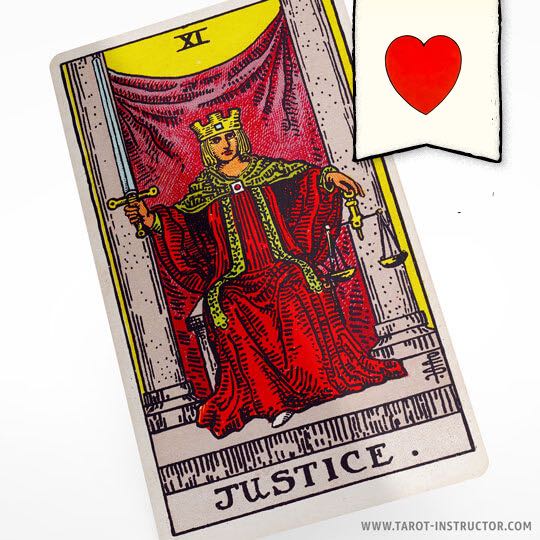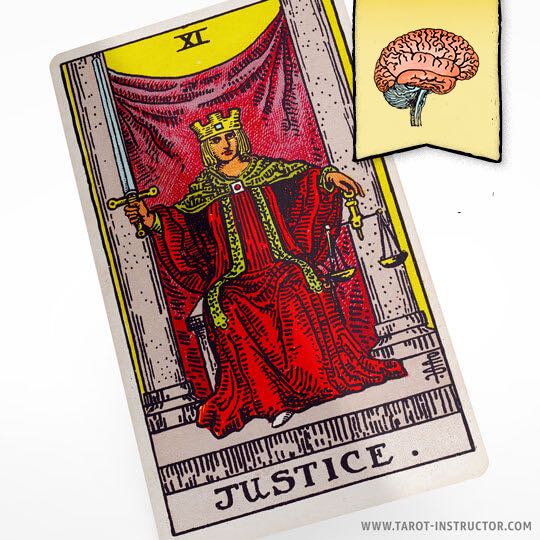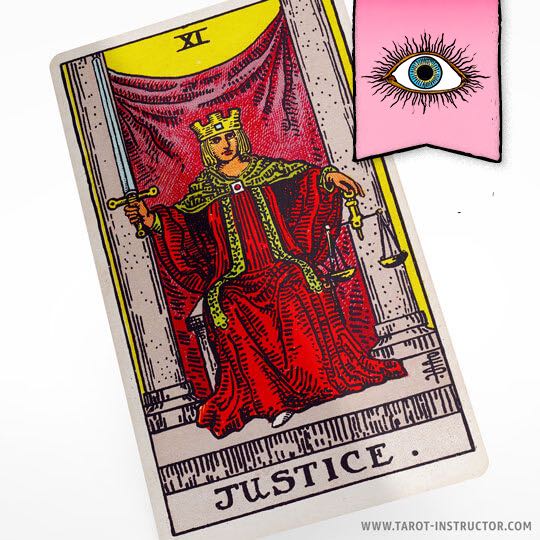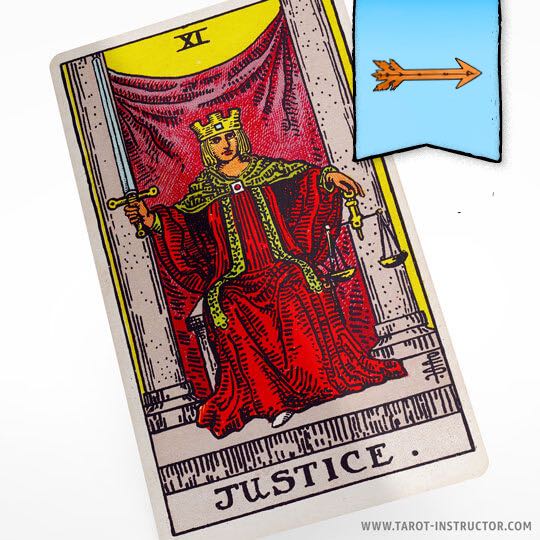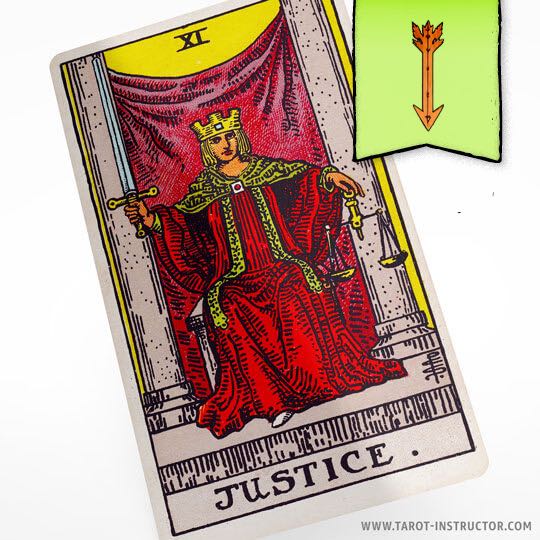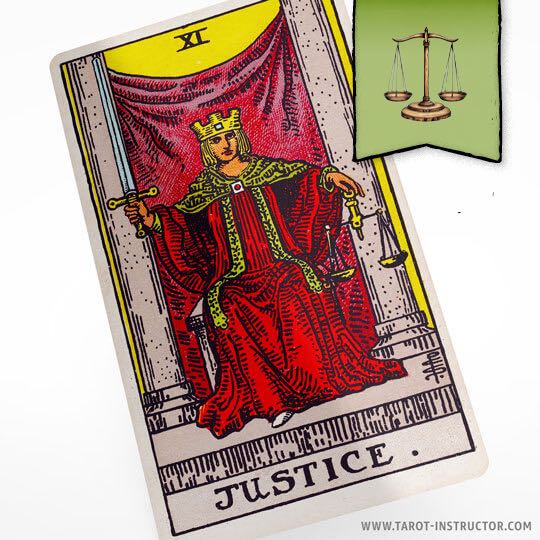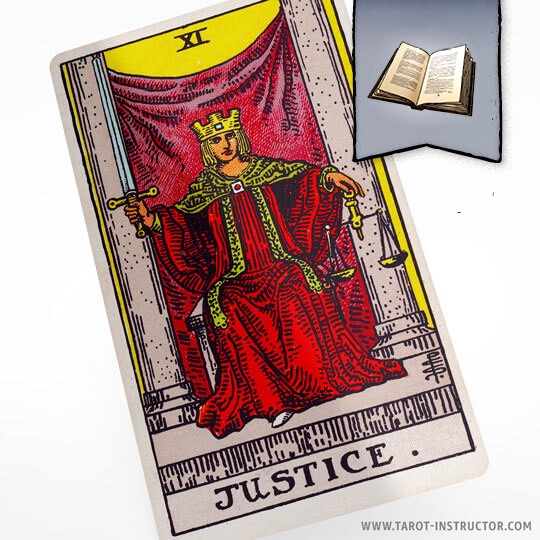Justice tarot card features following symbolic elements
Justice tarot card features following symbolic elements
Lady Justice: Reflects a deep yearning for fairness and equality in emotional connections. Sword: Signals a need for clarity and direct communication, urging to address misunderstandings. Scales: Indicates a desire for balance in give-and-take, fostering equal emotional investment. Blindfold: Suggests a longing for love that transcends superficial judgments, seeking authentic bonds. Crown: Expresses the importance of mutual respect and shared values in relationships. White Robe: Conveys a wish for purity and honesty in love, promoting integrity in interactions.
Justice as advice
„Seek fairness and truth in every situation.“
Justice keywords upright
Justice, Accountability, Law, Fair Treatment, Karma.
Justice keywords reversed
Injustice, Bias, Disorder, Imbalance, Unfairness, Inequity.
Justice card element
Air
Justice zodiac sign
Libra
Understanding Justice as Past Upright and Reversed
Justice is a profound card in the Tarot deck, embodying themes of fairness, truth, accountability, and the law of cause and effect. When drawn in the context of a past influence, Justice as past can unveil significant insights regarding various aspects of relationships—whether they are new, existing, or former. In this article, we will delve into the meanings of Justice as past in the context of relationships, both upright and reversed, providing a comprehensive understanding of its implications in various relational scenarios.
The Justice Card: An Overview
Before we explore its implications in relationships, it’s essential to grasp what Justice as past represents in the Tarot. Justice is typically numbered as 11, symbolizing balance, equilibrium, and the quest for truth. It embodies the principle that every action has consequences, and the need to strive for fairness in all interactions. When interpreted in the context of the past, Justice as past can indicate a time when one sought to establish fairness and accountability in their relationships, or conversely, a period when they faced the consequences of their actions.
Justice as Past in Potential Relationships
Upright: In the upright position, Justice as past signifies a time when one was focused on fairness and integrity in potential relationships. This influence likely led individuals to approach new connections with a sense of honesty and clarity. The need for balance in relationships may have guided them to carefully assess compatibility and mutual respect before diving in.
During this period, the individual may have been drawn to partners who shared similar values of fairness and justice, fostering connections that were grounded in mutual understanding. Justice as past encourages an environment where potential relationships could develop on solid foundations, marked by open communication and shared principles. This card suggests that these experiences helped shape one’s understanding of love and partnership, reinforcing the importance of equality and fairness in all interactions.
Reversed: When Justice as past appears reversed in the context of potential relationships, it can indicate a time marked by imbalance or unfairness. The individual may have struggled to find equitable connections, leading to relationships that felt one-sided or unjust. The reversed Justice can signify that past experiences were clouded by dishonesty or a lack of transparency, hindering the formation of genuine bonds.
In this state, the individual might have found themselves in situations where they overlooked red flags or ignored their intuition about unfair dynamics. This mindset could lead to feelings of frustration and disappointment as opportunities for connection slipped away due to unresolved issues. Justice as past reversed serves as a reminder that to cultivate healthy relationships, one must prioritize honesty and fairness, ensuring that both partners feel valued and heard.
Justice as Past in New Relationships
Upright: Justice as past in an upright position concerning new relationships reflects a time filled with clarity and fairness. The individual may have approached potential partners with a sense of integrity, ensuring that interactions were grounded in honesty and mutual respect. This openness likely allowed for the formation of connections that were both meaningful and equitable.
During this period, new relationships may have blossomed in an environment of trust, where both partners felt empowered to express their needs and desires. Justice as past encourages a sense of balance, suggesting that both individuals were willing to listen and compromise, leading to fulfilling and harmonious partnerships. This card highlights that these experiences laid the groundwork for deeper connections based on mutual understanding and shared values.
Reversed: When Justice as past appears reversed in the context of new relationships, it often highlights a past characterized by dishonesty or a lack of accountability. The individual may have entered new relationships with unrealistic expectations or a skewed sense of fairness, leading to misunderstandings and imbalance. In this state, they might not have fully recognized the importance of establishing clear boundaries and mutual respect.
The reversed Justice as past can also indicate a tendency to overlook significant issues or to engage in relationships that were fundamentally unfair. Reflecting on this period, the individual might recognize how their reluctance to address imbalances or injustices hindered their ability to form meaningful connections. This serves as a crucial reminder that fairness and honesty are vital components of any healthy relationship.
Justice as Past in Existing Relationships
Upright: Justice as past in an upright position regarding existing relationships suggests a time of balance and mutual respect. The individual may have approached their current relationship with a strong sense of fairness, ensuring that both partners felt valued and supported. This positive outlook likely fostered a deep bond characterized by open communication and shared decision-making.
In this context, Justice as past encourages a commitment to accountability within the relationship. Couples may have engaged in discussions about values, goals, and expectations, reinforcing their connection through mutual understanding and respect. The energy of Justice as past indicates that both partners were willing to address conflicts openly, fostering an environment where both felt heard and appreciated.
Reversed: When Justice as past appears reversed in the context of existing relationships, it often points to a period of imbalance or unresolved issues. The individual may have felt a sense of injustice within their relationship, where one partner’s needs overshadowed the other’s. The reversed Justice can signify a lack of communication or a reluctance to address pressing concerns that could enhance the relationship.
This energy may have led to feelings of frustration and resentment. The individual might have looked back at this time and recognized that their unwillingness to confront unfair dynamics contributed to a decline in intimacy and connection. It serves as a reminder that relationships require ongoing effort and a commitment to fairness and balance to thrive.
Justice as Past in Ex-Relationships
Upright: In the context of ex-relationships, Justice as past upright can signify a past marked by growth and valuable lessons learned. The individual may have approached their previous relationship with a strong sense of fairness, striving to ensure that both partners felt valued and respected. While the relationship may not have lasted, the experiences gained from it were enriching and contributed to their understanding of love.
Reflecting on this ex-relationship, the individual might recognize how the pursuit of justice and fairness shaped their views on future connections. Even if the relationship ended, it likely provided essential insights into their desires, needs, and expectations in subsequent partnerships. The upright Justice as past suggests that this past relationship was not a waste but rather a necessary step on their journey toward understanding love more deeply.
Reversed: When Justice as past appears reversed in the context of ex-relationships, it may indicate a time of regret or unresolved issues. The individual might look back on their previous relationship and see it as a series of mistakes or missed opportunities for fairness. This energy suggests that the person may have acted impulsively or failed to address significant imbalances that ultimately led to the relationship’s downfall.
The reversed Justice as past can also signify a reluctance to move on from the past. The individual may find themselves stuck in a cycle of regret or nostalgia, longing for what once was without acknowledging the reasons for the relationship’s end. This reflection can serve as a crucial lesson: to truly move forward, one must learn from past mistakes rather than dwell on them. Embracing the lessons of Justice as past can pave the way for healthier relationships in the future.
Conclusion
Justice as past is a card rich with meaning and implications, particularly regarding relationships. In its upright position, it represents fairness, accountability, and growth, while in its reversed state, it warns of imbalance, missed opportunities, and unresolved issues. By examining Justice as past in various relationship scenarios—potential, new, existing, and ex-relationships—we can gain valuable insights into our past behaviors and choices.
Understanding these dynamics can empower individuals to embrace their journey toward love with a renewed sense of clarity and purpose. Whether learning from past mistakes or celebrating joyful experiences, Justice as past reminds us that every relationship contributes to our growth and understanding of ourselves and others. Ultimately, the journey through love is an endeavor worth pursuing, filled with lessons that shape who we are and who we aspire to be.
Source: Wikipedia Justice tarot card
Reddit Justice tarot card
Quora Justice tarot card meaning
Unlock the mysteries of tarot cards.
